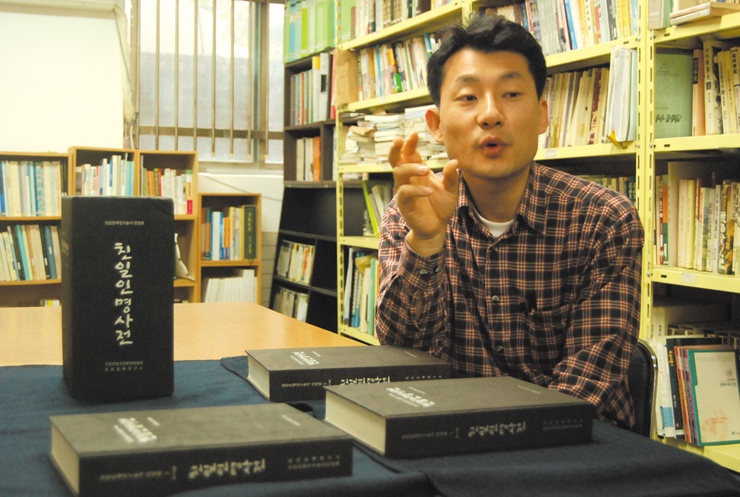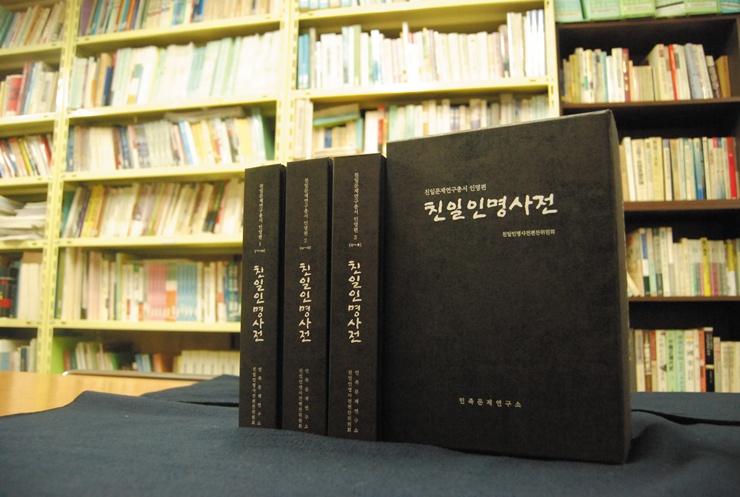

Recently, the Biographical Dictionary of Japan Collaborators has been published. The Hanyang Journal listens to the background for publishing the dictionary through [Interview]. -Ed.
On Nov. 8, 2009, the Institute for Research in Collaborationist Activities held a reporting ceremony for the publication of the Biographical Dictionary of Japan Collaborators. After this ceremony, some conservative activists sued the institute for listing the name of former President Park Chung-hee, a famous writer Jang Ji-yeon, and other famous people who they insist on having huge influence on the founding and leading of the Republic of Korea until today. Also, some insisted that their ancestors had done nothing wrong to be condemned as collaborators and asked the institute to un-list their ancestors' names. However, in spite of the protests the conservative activists are holding, the dictionary seems to have no legal flaw and will be opened to the public from December. Bang Hak-jin, the secretary-general of the institute revealed his opinion through the interview.

The Biographical Dictionary of Japan Collaborators
Q. What is the purpose of the publication of the dictionary and according to what course was it completed?
A. The purpose of the compilation is to blow life into our history by researching and revealing the people who collaborated to the Japanese colonial rule and counter-humane invasion war. To make a list of them, we first searched through official documents, newspapers, magazines and many other documentary records from the Japanese Imperialism and made up the database. Then, with the help of many experts and our compilation committee, we deliberated the database and decided who to put on the dictionary. Also, we were supported by our institute members and donations from more than 30,000 citizens. We were completely independent from the government's influence.
Q. What kinds of people are classified as the collaborators for Japan?
A. There are different standards for different parts. There will be the police and soldiers who actually committed murder. But we cannot say they are the only collaborators just because they are the ones who had blood on their hands. People who ordered them the action are also collaborators. People who supported and beautified Japan by literature are also collaborators. But abstractly, we call people who collaborated voluntarily, actively, repeatedly and continuously as collaborators for Japan.
Q. In your opinion, what kind of collaborators is the worst and must be punished heavily?
A. De Gaulle had said political and professional government officials and the intellectuals must be punished harshly. Also, Kim Gu once said that he got disgusted when he met people who protected the ones who wrote and made speeches for the Japanese Imperial. This means that both Eastern and Western culture agree that literate and intellects' collaboration has the biggest fault. Let us say today is Aug. 16, 1945. Korea gained liberation. Then we should punish the ones who actually participated in killing people. However, the time has passed. Therefore, we focused on giving historical lessons. We are not saying that we have to punish all the people listed in the dictionary and take away their properties. Since this book has its meaning as a record, we should also evaluate the people who had literal and artistic influence and reveal their faults, too.
Q. Other than Park Chung-hee, is there any other well-known people listed in the dictionary?
A. Of course there are. Most of the school founders are related. When the government tried to take land properties from collaborators, the owners of the land sold their land to religious organizations, educational organizations and speech organizations which were safe from the land reform policy. Look at universities. They all have second campus in other localities. There is a chance that even the founder of Hanyang University is also one of the Japan collaborators.

Institute and Society
Q. After the publication, there are a lot of people who agree and disagree about the dictionary. What do you think about those opinions?
A. Every problem in society has pros and cons. However, I believe everyone should agree with the just and great cause of the dictionary. On the constitution of the Republic of Korea, it says Korea has succeeded the interim government of Korea which worked based on the 3.1 movement spirit. Then as a country which succeeded that spirit, it is so obvious to reveal about the ones who betrayed and denied the country. If that is a problem, there is no meaning of the existence of a nation.
Q. What kind of reaction have you anticipated from the society? Did you expect this much disagreement?
A. The voice of opposition is always strong. It is not that they have more number. It means when they have a nice and shiny microphone to amplify their voice, we have nothing but a big number of people. They have powerful media supporting them. The counterforce always insisted that liquidation of Japan collaborators is too early. After the liberation, they insisted we should harmonize and develop the country first, and we should not fight over that kind of problem. But they say the same thing until today. That means they do not want the liquidation.
Q. Then how was the reaction from the government?
A. The government did not show any official opinion about the dictionary. That is what I feel so sorry about. This dictionary is all about this country. It is dealing with Korea's problem. But look at the government. They are not even giving small comments about the dictionary. Actually, our institute has done what the government should have done. They should feel gratitude toward us. I do not care about opinions of other country's government. But I believe our government should welcome the dictionary.
Q. How much interest do you think university students have on clearing collaborators for Japan?
A. I think the parents are to blame on the university students' indifference. Children's opinions are often relied on parent's opinions. This society enforces people to just avoid problems. People learned that when somebody stepped forward, they got killed. That kind of attitude was prevail for about 100 years. Also, our society is somewhat not able to think of doing something else. For example, there is a Brazil national soccer player, Socrates. People believe that his job is a national soccer player. But it is wrong. His actual job is a doctor. That is an opened-society. However, when we look through Korean society, I think it is somewhat far different from Brazil. At least as a university student and as intellectuals, I hope they have responsibilities to be interested in these problems.
Q. What role do you expect from the dictionary?
A. One of the comments I got from my supporter was that our institute was amazing to do this job. Well, if you go to some singers' fan club internet website, they are very obstinate. They leave bad comments and sometimes upload celebrities' graduation pictures. Similarly, I believe we must have that kind of concentration to study history to make a standard for future and for society's reflection. Since we have done this, people will think one more time before they do something wrong, that they might be recorded sometime later. In our institute, we made up a saying "Justice always records injustice." Then when people make one action, they would consider more for what they would be recorded as. That is my hope for this dictionary to do.
Lonely Fight
Q. What was the most difficult task?
A. Other than physical difficulty, the indifference from the society was the biggest difficulty. I understand history can be boring. But let us say that after a long trip, you have come back to home and found out that something was missing. To find out what is missing, you might search through whole house. Then you will make a list of the missing things. However, we do not even have that list about the 40 years of colonization. If there is no affection of the people, it should just disappear.
Q. What is the future plan of the institute and what kind of institute do you want to make?
A. We have a vision on building a historical center. Books have their limitation. If we gain abstract knowledge from books, then we need a space to actually convey the knowledge into action. In other words, we have arranged the software through dictionary. Now we need hardware for people to learn more. That is our second job. However, it took us 18 years to publish the dictionary. Nobody knows when the center will be built.
Also, we are an organization studying a specific field, and we must not stop there. We must practice it with citizens. We believe that research and practice are two wheels. We want to maintain and conduct that view.

